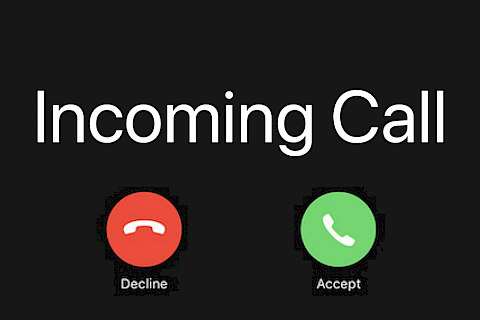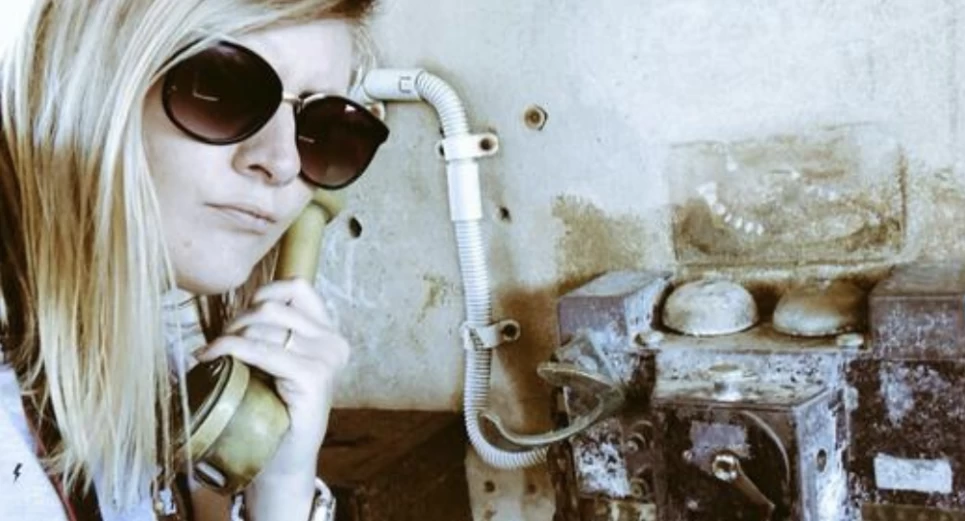

Telephone Telepathy
Before smartphones were invented, most people used landline phones without caller ID. Remember the excitement when you were younger and the phone rang? Everyone in the house would run to the phone hoping it was for them! (It also disconnected you from your dial-up internet connection...... the struggle was real). It wasn't until you answered the phone that you actually knew who was on the other side. "Hello?" You would say. The person would introduce themselves. How often did you reply with "I knew it was you" or "I was just thinking about you!". While a lot of people believe it is all just a coincidence, researchers have actually tested what is called telephone telepathy to see if there is anything to it. At the forefront of this research is Rupert Sheldrake.
Rupert Sheldrake Trials
Researcher Rupert Sheldrake is a well-known British Biologist, author, and researcher of parapsychology. He himself does not make claims about inexplicable phenomena, but instead, he studies them. I personally follow a lot of his research as he dares to ask questions that others do not. He backs up these questions with actual field research. His methods and experiments often draw criticism and labelled as pseudoscience, but this is the general attitude towards a lot of things within the paranormal field. As Sheldrake has stated, if people can claim their animals are psychic or that telepathy is a real thing that is tested, why then is it so outside the realm of possibility that telephone telepathy could exist?
Could apparent telephone telepathy merely be a matter of coincidence? Perhaps people often have thoughts about others for no particular reason. By chance, these thoughts may sometimes be followed by a telephone call from that person. If people only remember the times they are right and forget the times they are wrong, an illusion of telepathy may be created by a combination of coincidence and selective memory.
Alternatively, a person may be expecting a call around a particular time from a particular person, but may be unconscious of this expectation. So when the call comes there is no need to invoke telepathy because an unconscious expectation could explain it instead. The trouble is that unconscious expectations are elusive. Indeed, this may be an untestable hypothesis, because if the expectations of telephone calls are unconscious, how can anyone prove that they are really there? And if they are really there, then might they be a result of telepathy, rather than an alternative to it?
Journal of the Society for Psychical Research 67, 184-199 (July 2003)
by Rupert Sheldrake and Pamela Smart
These trials aren't referring to instances where you have arranged for your partner to call you when they are ready to be picked up when it is likely you know when and what the call will be. It relates to the more spontaneous cases.
Telephone telepathy trials
In each set of trials, there were 4 callers. In the first series of testing, the subject would select who the 4 callers would be. In the second series of testing, the subject would pick 2 of the callers and the testers would then select the other 2 callers who would be complete strangers to the subject. The caller would be selected at random by rolling a dice. Each caller was assigned a number and if their number was rolled on the dice, they would be the caller. If the dice rolled 5 or 6, it was rolled again until a number between 1-4 came up (as remember there were only 4 callers). When the subject would answer the phone, they had to answer by saying the name of who they believed was on the other end of the phone. The caller then would say their name so that the subject would receive feedback straight away.
As there was a 1 in 4 chance that the caller would guess correctly, the baseline figure was 25%. The subjects included in the testing were people who did not feel they had psychic ability but felt they 'knew' who was calling. Interestingly the results also indicated that the subjects had a higher success rate when the caller was someone they were close with. This ties in with the theory that we are potentially connected telepathically to our loved ones.
Combining the results of all our experiments, and adding in the trials conducted by Sam Bloomfield, there were 63 participants altogether. They made 231 correct guesses in 571 trials, a success rate of 40%, well above the mean chance expectation of 25% (Table 8). The 95% confidence limits of this result are from 36% to 45%. This effect was robust and repeatable and was hugely significant statistically (p = 4 x 10-16). Not all participants scored at levels above chance, but the great majority did so.
Journal of the Society for Psychical Research 67, 184-199 (July 2003)
by Rupert Sheldrake and Pamela Smart
Full results are published here: https://www.sheldrake.org/research/telepathy/experimental-tests-for-telephone-telepathy

The testing drew a lot of criticism from the scientific community due to the low sampling rate of participants. The next logical step? To test telepathic responses in relation to email.
Telepathy in connection to emails
Out of the 50 participants, 43 scored above chance levels and 7 below. By chance, according to the binomial distribution, 24 would be expected to score above chance and 26 below. The difference of the actual results from chance was statistically significant (z = 5.54; p = 2 x 10-8, one-tailed). There were 29 female participants and 21 male. The difference between the average scores for men and women was nonsignificant.
Perceptual and Motor Skills, (2005) 101, 771-786, © Perceptual and Motor Skills
by Rupert Sheldrake and Pamela Smart
To see the full paper of method and results: https://www.sheldrake.org/research/telepathy/testing-for-telepathy-in-connection-with-e-mails
The last piece of the puzzle, of course, was to look at text messaging.
Sensing the sending of SMS messages: an automated test
A related form of apparent telepathy occurs in connection with emails: someone thinks of a person for no apparent reason and soon afterwards receives an email from that person. In an experimental investigation of email telepathy, following a similar procedure to the telephone telepathy tests, participants had four potential emailers. In each trial the sender was selected at random. Before receiving the email from that sender, the participant guessed whom it would be from. In 137 videotaped trials, this hit rate of 47% was significantly above the chance level of 25% (d = .5, p < 1 x 10-6; Sheldrake & Smart, 2005).
A similar kind of apparent telepathy happens quite frequently among people who communicate by text (SMS) messages on mobile telephones. In this paper we describe an automated SMS experiment for which participants chose three family members or friends as potential senders. For each trial the sender was selected at random by the computer. All trials were coordinated automatically, and the data were stored in an online database.
The Journal of Science and Healing (2009) 5, 272-276
Rupert Sheldrake PhD, Leonidas Avraamides, and Matous NovakResults
Our hypothesis was that hit rates in an automated SMS telepathy test would be above chance levels, but the effect size would be smaller than in previous telephone and email telepathy experiments. We found that the overall hit rate of 37.9% was indeed higher than the chance level of 33.3% (p = .001), and the effect size (d = .1) was indeed smaller than in telephone telepathy tests (d = .45; Sheldrake and Smart, 2003b) and email telepathy tests (d = .5; Sheldrake and Smart, 2005). We expected a lower effect size for two reasons: the subjects in this SMS experiment were not selected on the basis of apparent telepathic ability, and also the subjects guessed who had sent them a message after the message had been sent, whereas the telephone and email experiments were simultaneous: the senders were thinking about the subject while she was making her guess.
The Journal of Science and Healing (2009) 5, 272-276
Rupert Sheldrake PhD, Leonidas Avraamides, and Matous Novak
To see the full paper with methods and results: https://www.sheldrake.org/research/telepathy/sensing-the-sending-of-sms-messages-an-automated-test
The text messaging tests were largely unsupervised and as acknowledged in the paper this leaves room for doubt. I think realistically we are now in a digital age and testing conducted online allows a larger sampling group and potentially includes people worldwide. While there are flaws in the controls and room for deception, most of the people involved you would imagine would be completing these kinds of trials honestly. This means however that even with the tightest of controls, these studies would draw criticism. Anything related to parapsychology and telepathy is often viewed as pseudoscience by the scientific community. While this view is changing, someone is always going to find a component with the testing that they have a problem with. It is the nature of the beast so to speak. The trials I don't believe were intended to be concrete evidence, but more to test the question and see if there really might be something to it
I think it is highly interesting that this has been studied as it is often speculated that we all have some sort of psychic capability within us. Some are able to access this more easily than others. Are these random acts of knowing who is calling an act of precognition?
Precogniton is best described as ‘future sight’. It is thought to be a form of extrasensory perception (ESP)where a person has a psychic ability to be able to see events in the future. A person is not mentally causing an event to happen, they are simply predicting it. Most commonly, people experience precognition in the form of a dream.
It is certainly something to think about! Remember, the paranormal goes much further than just talking to ghosts! While our minds can work against us, if unlocked, could they be responsible for creating some of the phenomena around us?
What do you think? Does this happen to you?
References:
Journal of the Society for Psychical Research 67, 184-199 (July 2003)
by Rupert Sheldrake and Pamela Smart
https://www.sheldrake.org/research/telepathy/experimental-tests-for-telephone-telepathy
Perceptual and Motor Skills, (2005) 101, 771-786, © Perceptual and Motor Skills
by Rupert Sheldrake and Pamela Smart
https://www.sheldrake.org/research/telepathy/testing-for-telepathy-in-connection-with-e-mails
The Journal of Science and Healing (2009) 5, 272-276
Rupert Sheldrake PhD, Leonidas Avraamides, and Matous Novak
https://www.sheldrake.org/research/telepathy/sensing-the-sending-of-sms-messages-an-automated-test
If you enjoy LLIFS, consider buying me a book (otherwise known as buy me a coffee but I don't drink coffee and I LOVE books). Your donation helps to fund the LLIFS website so everyone can continue to access great paranormal content and resources for FREE!

Top pages with similar subjects
Don't forget to follow the Facebook page for regular updates
Join the mailing list to receive weekly updates of NEW articles. Never miss an article again!
Buy the latest and past issues Haunted Magazine
Check out the books written by LLIFS